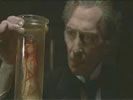Eye For Film >> Movies >> The Creeping Flesh (1973) Film Review
This is probably the closest Hammer imitators Tigon ever got to reproduce the genuine English Gothic of their more famous competitors. The Creeping Flesh is one of those films that you can't help but like, despite yourself.
It opens in the style of The Cabinet Of Dr Caligari, with Peter Cushing as the narrator, quickly establishing a solid sense of time and place; late Victorian England, a culture that believes in progress, with European civilisation - and the professional middle-class male, in particular - at its apogee.

Professor Emmanuel Hildern (Cushing) has just returned from a long trip to Papua New Guinea with the discovery that he hopes will make his name and fortune - the skeleton of a missing link that promises to revolutionise theories of man's origin.
As the professor starts to clean the skeleton's hand, the water inexplicably makes flesh form. He chisels off the offending finger - so obviously phallic it hardly counts as a subtext - and places the pink, swollen thing into a specimen jar.
Researching further, he uncovers references in his library to an evil god that would be awoken by the deluge, an event not scheduled for thousands of years, by which time the natives should have attained the same level of civilisation as his enlightened self.
Examining the creature's blood, Professor Hildern hits upon the idea of developing a serum that could be used to inoculate mankind against evil, ushering in a new age of peace. Who should emerge as an ideal test subject but his young daughter Penelope (Lorna Heilbron), who has started to display signs of the madness that led her late mother to the asylum, run by Emmanuel's half-brother and rival, (mad) scientist James, played by none other than Christopher Lee.
Needless to say the experiment doesn't go according to plan as, rather than becoming immune to evil, Penelope is overwhelmed by it and runs amok - note the obvious symbolism of her scarlet dress - thereby also bringing Emmanuel's researches to the attention of James, who's busy hunting down an escaped lunatic (Kenneth J Warren) of his own...
Okay, the evil god that can be revived by the rain idea stretches credulity, but the competing explanations of madness and criminality aren't too far off the mark when one thinks of the likes of the "science" of phrenology emerging around the same time. Plus, the Lee/Cushing partnership is always a joy to behold, not least for the way in which they can effortlessly invest even the most preposterous of material with far more gravitas than it possibly warrants - from the ridiculous to the sublime, as it were.
Other plaudits go to the ever-reliable Michael Ripper in one of his speciality minor character roles, invested with more personality than you would expect, and to Warren's tortured soul.
Freddie Francis's direction is better than might be expected, given that he took over from Don Sharp at short notice, while regular Tigon composer Paul Ferris contributes another effective score that owes little to the more bombastic House of Hammer approach of James Bernard.
All in all, one of the better examples of a style of horror that was soon thereafter to disappear forever in the wake of The Exorcist and The Texas Chainsaw Massacre.
Reviewed on: 06 Nov 2004



















